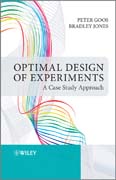
This book demonstrates the utility of the computer-aided optimal design approach using real industrial examples. These examples address questions such as the following: How can I do screening inexpensively if I have dozens of factorsto investigate? What can I do if I have day-to-day variability and I can onlyperform 3 runs a day? How can I do RSM cost effectively if I have categoricalfactors? How can I design and analyze experiments when there is a factor thatcan only be changed a few times over the study? How can I include both ingredients in a mixture and processing factors in the same study? How can I design an experiment if there are many factor combinations that are impossible to run? How can I make sure that a time trend due to warming up of equipment does not affect the conclusions from a study? How can I take into account batch information in when designing experiments involving multiple batches? How can I addruns to a botched experiment to resolve ambiguities? While answering these questions the book also shows how to evaluate and compare designs. This allows researchers to make sensible trade-offs between the cost of experimentation andthe amount of information they obtain. The structure of the book is organizedaround the following chapters: Introduction explaining the concept of tailored DOE. Basics of optimal design. Nine case studies dealing with the above questions using the flow: description design analysis optimization or engineering interpretation Summary. Technical appendices for the mathematically curious.
- ISBN: 978-0-470-74461-1
- Editorial: John Wiley & Sons
- Encuadernacion: Cartoné
- Páginas: 296
- Fecha Publicación: 01/07/2011
- Nº Volúmenes: 1
- Idioma: Inglés
